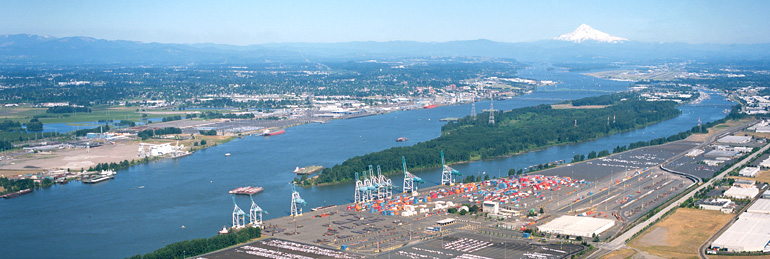Workers in Oregon are about to discover what it’s like to live in a world without international trade.
Since last month, two major shipping companies have announced that they’ll no longer use Portland’s Terminal 6, a 419-acre facility with seven gantry cranes.
The departure of Hanjin and Hapag-Lloyd will devastate the local economy.
“They take with them hundreds of jobs and a loss of stability for other businesses,” reports KGW, a television station. “Port and agriculture industry officials now fear other ports will become more expensive to ship out of, without Portland competing for the same business.”
As a farmer in the Walla Walla Valley, hundreds of miles up the Columbia River from Portland, I expect to feel the effects of this decision. This will make it harder to me to export my products overseas.
There’s only one real solution: More free trade. And that means lawmakers in Washington, DC must support Trade Promotion Authority, a legislative tool that will help our diplomats negotiate favorable deals with other countries.
I want to thank Senator Ron Wyden of Oregon, a Democrat, for reaching across the aisle and working with Republicans on this important measure. As the ranking member on the Senate Finance Committee, he played a major role in shaping this new measure.
Although President Obama supports TPA, many other Democrats do not—meaning that Wyden has engaged in an act of political courage that holds the potential to break the partisan gridlock that so often paralyzes Washington.
“Opening foreign markets, where most of the world’s consumers reside, is critical to creating new opportunities for middle-class American jobs in Oregon and nationwide,” said Wyden last week, as he introduced TPA. “This bill … sets our country and our state on the right track to craft trade policies that work for more people.”
Exports are key to American agriculture, and I rely on them from my farm, which sits mainly in Washington State but also dips down into Oregon. My main crop is alfalfa seed—and alfalfa-seed growers ship nearly 40 percent of what they produce to customers in foreign countries.
One of my fields in Oregon, for example, grows a special non-dormant variety of alfalfa for buyers in Saudi Arabia. We ship to them on barges that travel the Colombia River through Portland and on to our customers via ship.
You wouldn’t necessarily expect my little corner of Oregon to depend on foreign trade with Saudi Arabia. Yet it does, and I’m hardly alone in relying on exports.
The Business Roundtable estimates that more than 484,000 jobs in Oregon depend in some part on foreign trade. That’s one out of every five workers in the Beaver State, which exported more than $17 billion in goods and nearly $11 billion in services in 2013.
Small and medium-sized companies dominate this sector: Nearly 90 percent of Oregon’s exporters employ less than 500 people.
So in pushing for TPA, Wyden is looking out for the economic interests of ordinary Oregonians. He also knows that we need TPA now more than ever.
TPA is a simple legislative mechanism that allows the president to submit trade proposals to Congress for an up-or-down vote. It gives Congress the authority it deserves, but also prevents lawmakers from throwing monkey wrenches into the delicate agreements that our diplomats have negotiated with other countries.
Right now, we’re heading into in the final meetings on the Trans Pacific Partnership, a potential trade agreement to link Oregon and the rest of the United States with 11 other countries around the Pacific Rim. Eight of these countries are among the top-12 export markets for Oregon.
Without TPA, our officials will find themselves at a distinct disadvantage, unable to win the last-minute concessions that so often define global trade talks. This is especially important with respect to Japan, which may liberalize its agriculture markets to a degree previously unthinkable—but only if Congress approves TPA soon.
Workers at Portland’s Terminal 6 and across Oregon will depend on the success of both TPA and TPP—and the leadership of lawmakers like Sen. Wyden to make sure we get both.
Mark Wagoner is a third generation farmer in Walla Walla County, Washington where they raise alfalfa seed. Mark volunteers as a Board member for Truth About Trade & Technology (www.truthabouttrade.org).
Follow us: @TruthAboutTrade and @World_Farmers on Twitter | Truth About Trade & Technology on Facebook.


